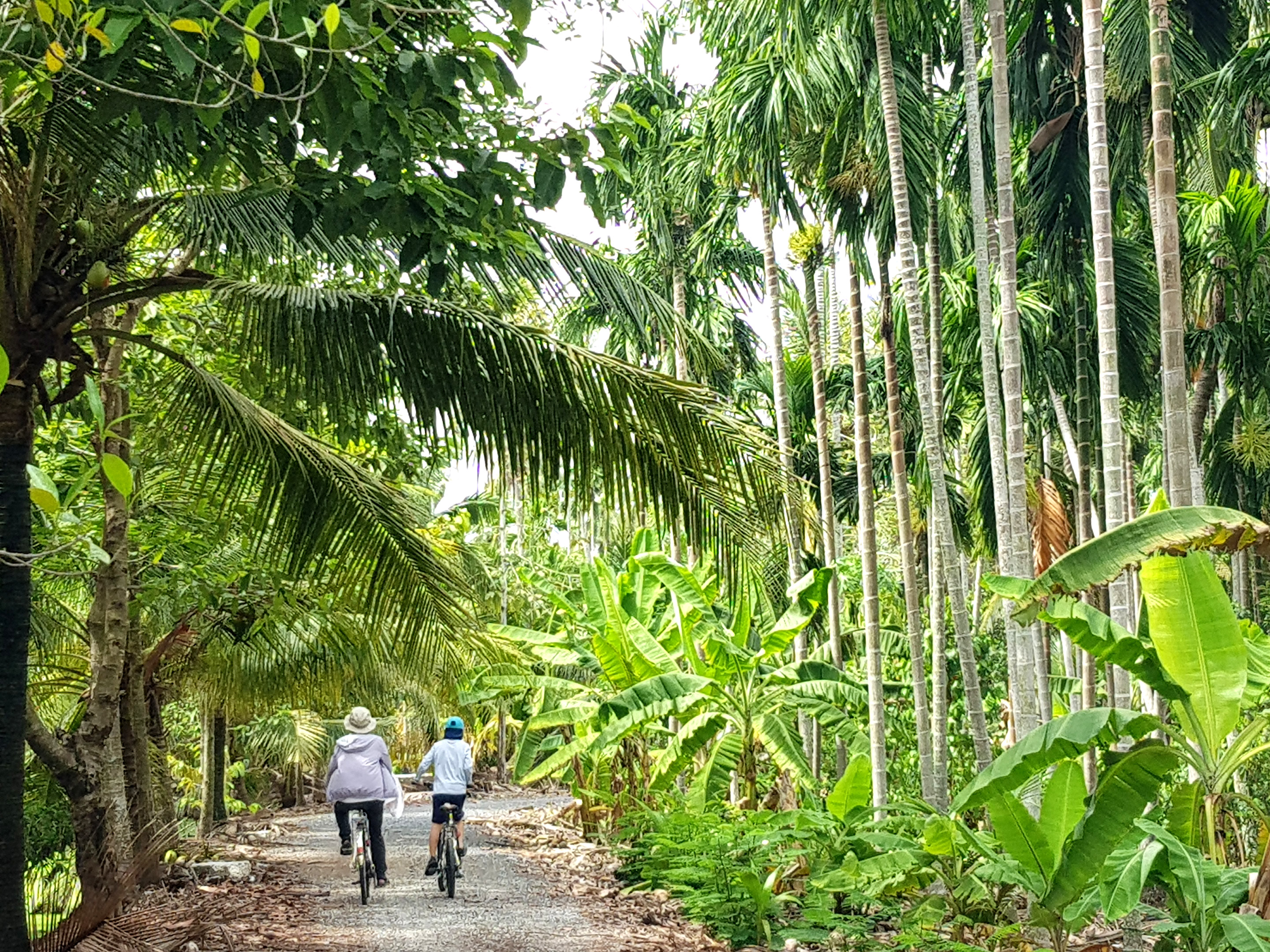The Empowering Eco-Cultural Entrepreneurship for Sustainable Livelihoods of Ditch Garden Community Along the Bang Pakong River in Chachoengsao Province
Main Article Content
Abstract
The community along the Bang Pakong River, located in Ban Khlong Bang Kluai and Ban Khlong Lat, Khlong Chuk Krache sub-district, Muang district, Chachoengsao province of Thailand, relies on middlemen for agricultural product sales. However, the COVID-19 pandemic disrupted production and caused financial hardships for the farmers. In response, the community sought to harness the resources of ditch garden by developing eco-cultural entrepreneurship. This study employed the 8-step indicator concept of eco-cultural entrepreneurs and the principles of the local economy. The community's approach involved: 1) promoting eco-cultural values; 2) raising awareness about the potential of ditch garden community and identifying the needs of eco-cultural entrepreneurs through cultural mapping; 3) developing the skills of eco-cultural entrepreneurs to create innovative eco-cultural products; 4) fostering entrepreneurship to ensure the sustainability of both the products and the community; 5) synthesizing knowledge through reflective learning and internal changes among eco-cultural entrepreneurs; and 6) sharing community stories and lessons learned to benefit the wider community. The outcomes include the emergence of 13 eco-cultural entrepreneurs who possess a deep understanding of local resources, as well as the development of eight ecological products, such as processed bananas, cultural learning classrooms, community learning paths, and a local knowledge set. These initiatives have provided alternative livelihood opportunities for eco-cultural entrepreneurs and community members. For instance, members of the Ban Khlong Bang Kluai banana processing group now earn an average monthly income of 111 USD per person. Additionally, the ditch garden community has generated income by leveraging eco-services and ensuring equitable distribution of tangible benefits. This case study highlights the potential of eco-cultural entrepreneurship as a sustainable approach for community development and economic resilience.
Article Details

This work is licensed under a Creative Commons Attribution-NonCommercial-NoDerivatives 4.0 International License.
Area Based Development Research Journal values copyright protection and licensing to safeguard author rights and facilitate the appropriate dissemination of research. Our policies ensure openness, accessibility, and attribution. Authors retain copyright ownership, and articles are published under a Creative Commons Attribution License (CC BY), allowing sharing, adaptation, and proper attribution. Authors have the freedom to publish under the CC BY license, granting broad reuse and distribution permissions. The journal supports posting articles on third-party repositories, adhering to institutional and funding restrictions. Author guidelines detail copyright and licensing requirements, empowering authors with knowledge about their rights and responsibilities. These policies cultivate an environment of collaboration, openness, and responsible sharing, benefiting authors and the research community while honoring intellectual property rights.
References
Anusonphat, N., & Poompurk, C. (2022). New normal ways for the survival and adaptation of community enterprise after covid-19 crisis of Thailand. Journal of MCU Nakhondhat, 9(1), 1-19. (in Thai).
Asdonnithee, S., & Sophonsuwaphap, P. (2021). A research and development process of eco-cultural products of Bangpakong river basin communities, proceeding within the paradigm of holistic development. E-Journal of Institute of Culture and Arts Journal Srinakharinwirot University, 23(1), 76-92. (in Thai).
Asdonnithee, S., Sophonsuwaphap, P., & Tattiyakul, K. (2020). The contemplation-oriented transformative learning facilitation for cultivating eco-cultural entrepreneurs of the Bang Pakong communities. Journal of Humanities and Social Sciences Burapha University, 28(2), 265-294. (in Thai).
Community Organizations Development Institute, (2016). Handbook for promoting the development of the local economy. Bangkok: Community Organization Developments Institute. (in Thai).
Kaewthep, K. (2009). Dissemination and monitoring of research results in participatory cultural management. Bangkok: Office of the National Cultural Commission, Ministry of Culture. (in Thai).
Kaewthep, K. (2021). Horse riding along the camp: Lessons on working with local research associates. Chiang Mai: Community-Based Research Institute Foundation. (in Thai).
Klangrahad, C., Thonglor, R., Promma, P., & Praneetponkrang, S. (2019). Business model innovation of entrepreneur the moon hostel: Research to create grounded theory. Veridian E-Journal, Silpakorn University, 12(3), 141-155. (in Thai).
Nakham, M. (2016). Livelihoods of fruit orchard farmers within the Mae Klong ecosystem. Humanities and Social Sciences, 33(3), 163-192. (in Thai).
National Culture Act. (2010). Royal Gazette. Volume 127, Chapter 69, p.1. (in Thai).
Pillai, J. (2013). Cultural mapping: A guide to understanding place, community and continuity. Selangor: Strategic Information and Research Development Center.
Suwanna, A., Chaiprakong, T., Nimitkul, C., Keatipong, K., & Aramsri, K. (2021). Community entrepreneurship development in Mae Sa-Kog Ma UNESCO biosphere reserve, Chiang Mai province. Area Based Development Research Journal, 13(3), 193-211. (in Thai).
Tansupol A. (2016). Cultural ecology: A key to sustainable development. Humanities and Social Sciences, 12(1), 193–221. (in Thai).
Unthiwarothai, P. (2002). The role of education in cultural inheritance and development: a case study of farmer culture on the Thonburi side. (Doctoral' s thesis). Chulalongkorn University, Faculty of Education. (in Thai).
Wittayaphak. C. (2018). Human ecology: Environmental studies in social and cultural dimensions. Chiang Mai: Research Administration Center Chiang Mai University. (in Thai).


